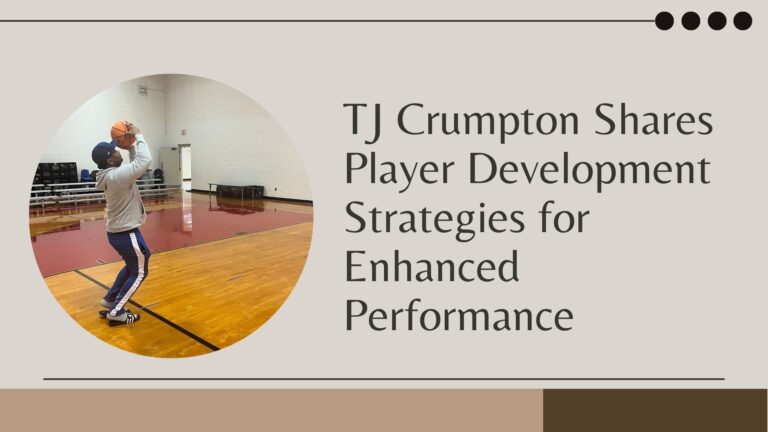Player development is the cornerstone of success in basketball, and coaches play a pivotal role in helping athletes reach their full potential. TJ Crumpton, a seasoned figure in the world of basketball coaching, has been instrumental in honing the skills of numerous players. In this comprehensive article, we will delve into the basics of player development strategies and explore the techniques coaches, like TJ Crumpton, employ to improve player skills and performance.
1. The Art of Skill Development
Skill development is the heart of player improvement. This section will delve into the importance of mastering the fundamentals, including shooting, dribbling, passing, and defensive skills. Tarik Crumpton’s philosophy emphasizes the significance of these core skills as building blocks for players to achieve excellence.
His approach involves breaking down complex movements into their fundamental components, focusing on repetition, and progressively building skill levels, ensuring that players not only grasp these basics but also integrate them seamlessly into their gameplay.
2. Individualized Training Plans
Every player is unique, and effective player development recognizes that one size does not fit all. We’ll explore how coaches like Tarik design individualized training plans that cater to the specific needs, strengths, and weaknesses of each player, nurturing their growth. These tailored plans take into account factors such as player position, playing style, physical attributes, and personal goals.
Coaches like Tarik Crumpton understand that customization is key to unlocking a player’s full potential, as it empowers them to address their distinct areas for improvement and build on their existing strengths, ultimately maximizing their performance on the basketball court.
3. Video Analysis and Feedback
The use of video analysis has revolutionized player development. TJ Crumpton highlights the power of visual feedback in helping players understand their performance better. This section will discuss how coaches utilize video technology to provide constructive feedback and insights to players.
Through the detailed examination of game footage and practice sessions, coaches can pinpoint areas for improvement, correct technique errors, and highlight successful plays, offering players a comprehensive and visual understanding of their performance.
4. Mental Conditioning
Basketball is not just about physical skills; mental toughness is equally critical. His approach includes mental conditioning techniques that help players build resilience, focus, and confidence. We will delve into the strategies coaches use to develop a player’s mental game.
These strategies encompass visualization exercises, mindfulness training, and stress management techniques, providing players with the mental fortitude to stay composed under pressure, bounce back from setbacks, and maintain unwavering self-assurance, ultimately contributing to their overall performance and success on the basketball court.
5. Game Situational Drills
Game situations often define a player’s performance. Coaches design situational drills that mimic real game scenarios. This section will explore the types of drills used to enhance decision-making, adaptability, and composure during actual games.
These drills encompass late-game situations, fast breaks, defensive stops, and high-pressure free throws, allowing players to hone their skills in contexts that mirror the intensity and dynamics of actual matches.
6. Strength and Conditioning
A player’s physical fitness is a fundamental aspect of their skill set. TJ Crumpton emphasizes the importance of strength and conditioning programs tailored to basketball. We’ll discuss how coaches work to enhance a player’s endurance, agility, and overall athleticism through specialized training regimens.
These programs often include a mix of cardiovascular conditioning, weight training, plyometrics, and agility drills to ensure that players are not only skilled but also physically prepared to excel on the basketball court.
7. TJ Crumpton: Building Confidence
Confidence is the driving force behind great performances. Coaches play a critical role in instilling confidence in their players. We’ll explore the strategies used to nurture self-belief and self-assuredness, allowing players to perform at their best.
These strategies include positive reinforcement, constructive feedback, setting achievable goals, and creating an environment where players feel empowered to take risks and learn from their mistakes.
8. Balancing Individual and Team Development
While player development is primarily individual, it must also align with the team’s goals and dynamics. His experience provides insights into striking the right balance between personal growth and team integration.
We’ll discuss how coaches achieve this equilibrium by fostering a culture of collaboration, emphasizing individual roles within the team framework, and ensuring that player development serves the greater purpose of the team’s success.
9. Tracking Progress and Assessments
Measuring player improvement is essential for both players and coaches. We’ll explore how coaches, including TJ Crumpton, track player progress and conduct assessments to identify areas of growth and areas that may still need attention.
This often involves a combination of performance metrics, regular feedback sessions, and self-assessment, providing a comprehensive view of each player’s development journey.
10. Mentorship and Guidance
Effective player development often goes beyond the court. Coaches like TJ Crumpton understand that their role extends to shaping not just the athlete, but also the individual. They provide mentorship and guidance to their players, helping them navigate the challenges of both basketball and life.
This mentorship can include imparting life skills, emphasizing the importance of academics, and instilling values like teamwork, discipline, and sportsmanship. Coaches like Tarik Crumpton serve as not only basketball guides but also life mentors, preparing their players for success both on and off the court.
Conclusion
Player development strategies are the bedrock of success in basketball. Whether it’s mastering fundamental skills, offering individualized training, or focusing on mental conditioning, coaches like TJ Crumpton play a pivotal role in guiding players toward their full potential. Aspiring athletes and coaches alike can learn from these fundamental techniques to help players unlock their skills and reach new heights on the court.
Also Read: Erik Litmanovich Explains The Difference Between Organic vs. Conventional Food Production


